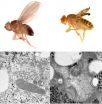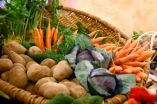(Press-News.org) Winston-Salem, N.C. – Researchers for the first time have shown that drinking beet juice can increase blood flow to the brain in older adults – a finding that could hold great potential for combating the progression of dementia.
The research findings are available online in Nitric Oxide: Biology and Chemistry, the peer-reviewed journal of the Nitric Oxide Society and will be available in print soon. (Read the abstract.)
"There have been several very high-profile studies showing that drinking beet juice can lower blood pressure, but we wanted to show that drinking beet juice also increases perfusion, or blood flow, to the brain," said Daniel Kim-Shapiro, director of Wake Forest University's Translational Science Center; Fostering Independence in Aging. "There are areas in the brain that become poorly perfused as you age, and that's believed to be associated with dementia and poor cognition."
High concentrations of nitrates are found in beets, as well as in celery, cabbage and other leafy green vegetables like spinach and some lettuce. When you eat high-nitrate foods, good bacteria in the mouth turn nitrate into nitrite. Research has found that nitrites can help open up the blood vessels in the body, increasing blood flow and oxygen specifically to places that are lacking oxygen.
In this study, the first to find a link between consumption of nitrate-rich beet juice and increased blood flow to the brain, Translational Science Center researchers looked at how dietary nitrates affected 14 adults age 70 and older over a period of four days.
On the first day, the study subjects reported to the lab after a 10-hour fast, completed a health status report, and consumed either a high- or low-nitrate breakfast. The high-nitrate breakfast included 16 ounces of beet juice. They were sent home with lunch, dinner and snacks conforming to their assigned diets.
The next day, following another 10-hour fast, the subjects returned to the lab, where they ate their assigned breakfasts. One hour after breakfast, an MRI recorded the blood flow in each subject's brain. Blood tests before and after breakfast confirmed nitrite levels in the body.
For the third and fourth days of the study, the researchers switched the diets and repeated the process for each subject.
The MRIs showed that after eating a high-nitrate diet, the older adults had increased blood flow to the white matter of the frontal lobes – the areas of the brain commonly associated with degeneration that leads to dementia and other cognitive conditions.
"I think these results are consistent and encouraging – that good diet consisting of a lot of fruits and vegetables can contribute to overall good health," said Gary Miller, associate professor in the Department of Health and Exercise Science and one of the senior investigators on the project.
To make the sometimes-bitter beet juice tastier – so a greater number of people will drink it and reap its health benefits – the university has worked with a company to create a new beet juice-based beverage. The university is currently looking into ways of marketing the beverage.
INFORMATION:
Radiology professor Dr. Jonathan Burdette is senior author of the current research paper with Kim-Shapiro and Miller. Secondary authors include Tennille D. Presley, Ashley R. Morgan, Erika Bechtold, William Clodfelter, Robin W. Dove, Janine M. Jennings, Robert A. Kraft, S. Bruce King, Paul J. Laurienti and W. Jack Rejeski.
The National Institutes of Health contributed funding for this research.
The Center for Translational Science; Fostering Independence in Aging focuses on the promotion and maintenance of functional health as people age. Center researchers study how diet and exercise can change cognitive and physical function. The center's team involves medical staff, behavioral scientists and other scientists who develop research-based interventions to help both physical and cognitive health in aging populations.
Daily dose of beet juice promotes brain health in older adults
2010-11-03
ELSE PRESS RELEASES FROM THIS DATE:
Severely injured should go directly to trauma center: Research
2010-11-03
TORONTO, Ont., Nov. 2, 2010-Severely injured patients should be transported directly from the scene of an accident to a trauma center, even if it means bypassing a closer hospital, according to new research that shows this results in a nearly 25 per cent lower death rate.
However, even though 80 to 85 per cent of people in North America live within a one-hour drive or flight of a trauma center, 30 to 60 per cent of severely injured patients are still taken to the nearest hospital.
Researchers led by Dr. Avery Nathens, trauma director at St. Michael's Hospital in Toronto, ...
Scientists at IRB Barcelona discover a new protein critical for mitochondria
2010-11-03
A study by the team headed by Lluís Ribas de Pouplana, ICREA professor at the Institute for Research in Biomedicine (IRB Barcelona), has been chosen as "Paper of the week" in the December issue of the Journal of Biological Chemistry, which is already available online. The article describes the discovery of a new protein in the fly Drosophila melanogaster (fruit fly) that is crucial for mitochondria. The removal of SLIMP in these flies leads to aberrant mitochondria and loss of metabolic capacity, thus causing death.
The study, whose first author is Tanit Guitart, a PhD ...
Brain's ability to selectively focus/pay attention diminishes with age
2010-11-03
A University of Toronto study shows that visual attention -- the brain's ability to selectively filter unattended or unwanted information from reaching awareness -- diminishes with age, leaving older adults less capable of filtering out distracting or irrelevant information.
Further, this age-related "leaky" attentional filter fundamentally impacts the way visual information is encoded into memory. Older adults with impaired visual attention have better memory for "irrelevant" information. The research, conducted by members of U of T's Department of Psychology, will ...
Shift work linked to higher risk of work injury: UBC study
2010-11-03
Canadians who work night and rotating shifts are almost twice as likely to be injured on the job than those working regular day shifts, according to a study by researchers at the University of British Columbia.
The study, published in the current issue of the Scandinavian Journal of Work, Environment and Health, examined data on more than 30,000 Canadians collected as part of Statistics Canada's Survey of Labour and Income Dynamics and compared results between workers involved in different types of shift work from 1996-2006. It shows that while the overall rate of work ...
Every person emits 2 tons of CO2 a year through eating
2010-11-03
Every person emits the equivalent of approximately two tonnes of carbon dioxide a year from the time food is produced to when the human body excretes it, representing more than 20% of total yearly emissions. That is what a study by the Universidad de Almería says, confirming for the first time that human excrements contribute to water pollution, primarily with nitrogen and phosphorus.
A team of researchers from the Universidad de Almería (UAL) has estimated the environmental impact of the Spanish diet and role that human excrements play in the life cycle of food. It is ...
Algae for biofuels: Moving from promise to reality, but how fast?
2010-11-03
A new report from the Energy Biosciences Institute (EBI) in Berkeley projects that development of cost-competitive algae biofuel production will require much more long-term research, development and demonstration. In the meantime, several non-fuel applications of algae could serve to advance the nascent industry.
"Even with relatively favorable and forward-looking process assumptions (from cultivation to harvesting to processing), algae oil production with microalgae cultures will be expensive and, at least in the near-to-mid-term, will require additional income streams ...
Exposure of humans to cosmetic UV filters is widespread
2010-11-03
Amsterdam, 2 November, 2010 - An investigation conducted in the context of the Swiss National Research Programme (NRP50), Endocrine Disrupters: Relevance to Humans, Animals and Ecosystems, demonstrates for the first time that internal exposure of humans to cosmetic UV filters is widespread.
In the course of the Summer and Fall 2004, 2005 and 2006 (3 cohorts), human milk was sampled by mothers who had given birth at the University Women's Hospital in Basel. The participants filled out a detailed questionnaire with general questions and, as special feature, in depth questions ...
New long-range undersea robot goes the distance
2010-11-03
Over the past decade, the undersea robots known as autonomous underwater vehicles (AUVs) have become increasingly important in oceanographic research. Today's AUVs fall into two groups: 1) propeller-driven vehicles that can travel fast and carry lots of instruments, but are limited to expeditions of only a few days; and 2) "gliders," which can stay at sea for weeks or even months at a time, but cannot travel very quickly. MBARI engineers recently demonstrated a new super-efficient AUV that combines the best of these two approaches. This new long-range AUV (LRAUV) can travel ...
Mayo Clinic Proceedings: November highlights
2010-11-03
The November issue of Mayo Clinic Proceedings includes three articles with leading research, highlighted below.
Khat Chewing Increases Risk of Stroke and Death in Patients With Acute Coronary Syndrome
ROCHESTER, Minn. -- Researchers found that people who chew khat and present with acute coronary syndrome had significantly higher rates of death, cardiogenic stroke, and stroke complications, despite having lower cardiovascular risk profiles.
"The leaves of khat, a leafy green shrub, are chewed habitually for euphoric and stimulating effects. The main ingredients, ...
First peer-reviewed study finds BPA levels in US foods 1,000 times less than limits
2010-11-03
Note to journalists: Please credit the journal or the American Chemical Society as publisher of this report.
WASHINGTON, Nov. 2, 2010 — For the first time in the United States, researchers are reporting in a peer-reviewed scientific journal today detection of Bisphenol A (BPA) in fresh and canned food as well as food wrapped in plastic packaging. The amounts in the limited sample, however, were almost 1,000 times lower than the "tolerable daily intake" levels set by the U.S. Environmental Protection Agency (EPA) and the European Food Safety Authority (EFSA). Their report ...



